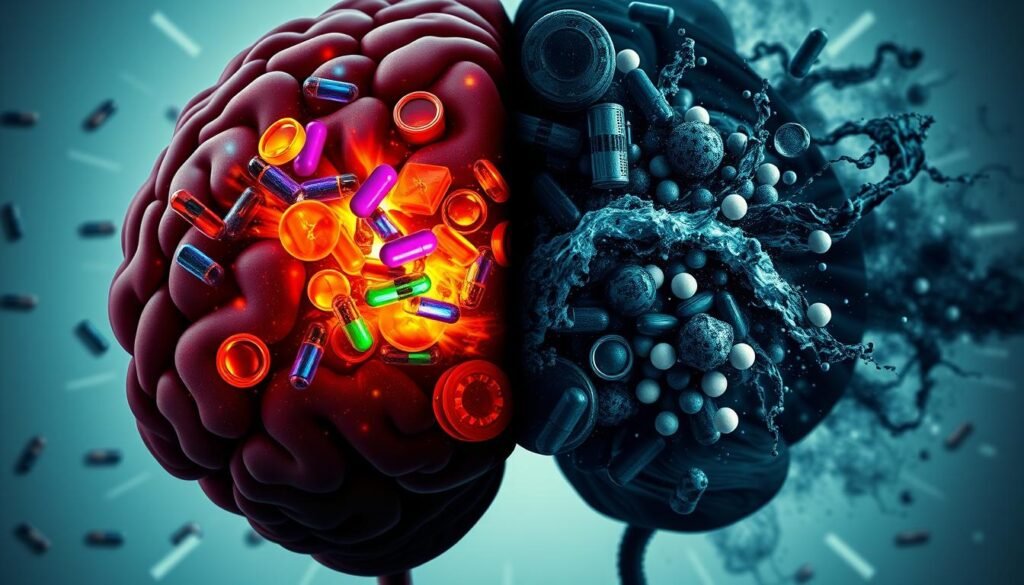In the U.S., around 10% of kids have ADHD. About 3.1% of them used Adderall in the past year. This shows many rely on this drug to treat ADHD. But, people often wonder: can Adderall cause anxiety? Being a stimulant, Adderall might increase anxiety in some people. Knowing about this can help users get the most out of the medication. It also helps in dealing with the side effects.
This article looks into the possible link between Adderall and anxiety. We’ll cover the anxiety symptoms Adderall might cause, why this happens, and how to handle it. If you use Adderall for ADHD or narcolepsy, understanding these challenges is key. You can find more information on Talkiatry’s guide on Adderall and anxiety.
Key Takeaways
- Adderall is commonly prescribed for ADHD, affecting many children in the U.S.
- The medication can lead to anxiety symptoms as a side effect.
- Maintaining a regular sleep schedule may help alleviate anxiety risks.
- Regular exercise and outdoor activities can reduce anxiety levels.
- Mindfulness practices, such as journaling, can support mental well-being.
- Consulting with a healthcare provider is essential for managing symptoms.
Understanding Adderall and Its Uses
Adderall mixes amphetamine and dextroamphetamine, two powerful stimulants. It’s mainly used for treating ADHD and narcolepsy. The drug works by boosting neurotransmitter release. This helps improve focus and lowers impulsivity, aiding those with ADHD to better handle daily tasks.
Studies on Adderall show mixed effects on anxiety. Some research suggests it may reduce anxiety risk. Yet, long-term use might increase anxiety when stopped, especially within two weeks. It’s crucial to know how Adderall affects mental health, particularly its link to anxiety and panic attacks.
Given its potential side effects, Adderall should only be taken with a doctor’s guidance. It might cause anxiety symptoms, like heightened energy, distractibility, and rapid speech, in some people. Being aware of these possible issues is essential for Adderall users.
What is Adderall?
Adderall is known as a stimulant for the central nervous system. Doctors often prescribe it for ADHD and narcolepsy. The adderall definition includes its use in helping with hyperactivity and impulsiveness by changing how the brain works. It combines dextroamphetamine and amphetamine, enhancing the nervous system’s activity.
Its main role is to impact the brain’s chemicals that help control attention and behavior. Adderall does this by boosting levels of dopamine and norepinephrine. This action helps with different ADHD types: inattentive, hyperactive-impulsive, and the mixed type.
High doses of Adderall can sometimes make anxiety worse. This can happen if it’s misused or because of how a person with ADHD reacts. Many people with ADHD felt anxious even before taking Adderall. So, it’s hard to tell if the medication causes more anxiety or not.
Knowing the good and bad about Adderall is crucial, especially for those prone to anxiety. Keeping a close watch and making the right dose changes are key. This helps balance the medication’s positive effects against possible anxiety issues.
When is Adderall Prescribed?
Adderall is known for helping with ADHD. It fixes neurotransmitter levels in the brain. This helps people who can’t focus, act too active, or act without thinking. ADHD and narcolepsy are the main reasons for prescribing Adderall. People with ADHD often do much better in focusing and controlling themselves with Adderall prescriptions.
Adderall isn’t just for ADHD. It’s also used for chronic fatigue, narcolepsy, binge-eating, autism, and hard-to-treat depression. With more people getting stimulant prescriptions, doctors watch for addiction risks.
However, many people with ADHD also have anxiety. More than half, actually. This is important for doctors to think about when giving out Adderall. For some, symptoms like worry or heart racing can get worse. Talking to a doctor about any side effects is key. To learn more, check out the connection between Adderall and anxiety.
Can Adderall Cause Anxiety?
Adderall treats ADHD by boosting focus and reducing impulsivity. But many ask, does Adderall cause anxiety? A number of users report adderall anxiety symptoms while on the medication. It’s important to understand how Adderall might lead to anxiety.
Common Anxiety Symptoms Associated with Adderall
Stimulants like Adderall can lead to distressing anxiety signs. Symptoms often include:
- Nervousness or restlessness
- Rapid heartbeat
- Racing thoughts
- Heightened stress levels
Half of those with ADHD also have an anxiety disorder, complicating the picture. Anxiety may seem more intense for newcomers to Adderall or those adjusting doses.
Factors Contributing to Anxiety from Adderall
Certain elements can heighten anxiety when on Adderall. These factors involve:
- Dosage increases: Higher doses may intensify anxiety symptoms.
- Individual reactions: Everyone’s response to stimulants varies, with some being more sensitive.
- Past anxiety: Those with previous anxiety issues might see a worsening.
Gender differences matter too. Studies suggest women may react differently to Adderall, possibly experiencing more anxiety. Tailored treatments are crucial according to research. To learn about Adderall’s side effects, check out this source.

Why Might Adderall Contribute to Anxiety?
Adderall is a medication prescribed for ADHD and narcolepsy. It contains amphetamine and dextroamphetamine, which boost neurotransmitter levels in the brain. These neurotransmitters include dopamine and norepinephrine. For people with ADHD, this increase can be very beneficial. However, Adderall might also lead to anxiety.
The drug’s stimulant nature can cause increased heart rate and blood pressure. These effects may feel like anxiety symptoms. Users often report nervousness, worry, and a racing heart. For those with anxiety disorders, Adderall might worsen their feelings.
When the drug’s effect fades, some people feel a mood drop. This sudden change can trigger anxiety or panic. It’s especially true for those who haven’t found the right ADHD treatment. This cycle can highlight the link between Adderall and anxiety.
Abusing Adderall or not following the prescribed dose can lead to dependence. Over 5 million Americans over twelve misused such medications in 2018. Dependency can fuel anxiety, making users anxious for more of the drug when they can’t get it.
Getting professional support is crucial for those misusing Adderall. If not supervised, the drug can be addictive and worsen mental health issues. Healthcare providers can suggest alternative treatments or adjust the current plan to address any anxiety or addiction effectively.
| Contributing Factors | Impact on Anxiety |
|---|---|
| Stimulant properties | Mimics anxiety symptoms like increased heart rate |
| Wear-off period | Can lead to feelings of panic or increased anxiety |
| Dependency risks | Craving and withdrawal symptoms can worsen anxiety |
| Pre-existing conditions | Individuals with anxiety disorders may face heightened symptoms |
Does Adderall Cause Anxiety? Exploring the Connection
Adderall and anxiety have a complex relationship. This drug helps with ADHD but might make some people feel anxious. Studies show that anxiety from Adderall can happen, with how bad it is varying from person to person. Things like the dose, the user’s body, and existing anxiety issues matter.
It can make your heart rate and blood pressure go up, leading to more anxiety. People might feel restless, easily annoyed, and have trouble sleeping. Stopping Adderall can make anxiety worse, causing agitation and nervousness. It’s important to know how Adderall could affect your anxiety.
Living a healthy life helps manage anxiety. Exercise, good food, and dealing with stress properly are key. Using relaxation methods like deep breathing and yoga helps calm Adderall-induced anxiety. Talking openly with doctors to tweak treatment is important when Adderall triggers anxiety.
If anxiety doesn’t go away, looking at other options like atomoxetine or guanfacine is a good idea. Understanding these details helps in making the right decisions for treatment. It encourages helpful talks with doctors on how to tackle Adderall-related anxiety.

| Symptoms of Adderall-Induced Anxiety | Potential Causes |
|---|---|
| Increased heart rate | Physiological response to medication |
| Restlessness | High dosage or sensitivity |
| Irritability | Withdrawal effects |
| Difficulty sleeping | Stimulant nature of Adderall |
| Muscle tension | Heightened nervous system activity |
| Increased sweating | Sympathetic nervous system response |
| Gastrointestinal symptoms | Stress and anxiety interactions |
Managing Adderall-Related Anxiety
Managing Adderall-related anxiety involves understanding its effects on anxiety. It’s crucial for tackling this issue effectively. A variety of strategies can help reduce anxiety caused by Adderall and boost mental health.
Consult Your Doctor
If you’re dealing with anxiety from Adderall, see a healthcare professional. They might adjust your dose or suggest different meds. Your doctor will offer advice tailored to your health history and meds.
Limit Caffeine Intake
Cutting down on caffeine can lessen anxiety symptoms. Since Adderall and caffeine both are stimulants, they can worsen anxiety. By reducing caffeine, you can help keep anxiety in check and stay calmer during the day.
Practice Meditation and Mindfulness
Meditation and mindfulness can improve your emotional health and help with Adderall anxiety. Deep breathing, guided meditations, and yoga can help you relax and be more mindful. These practices offer great support in achieving calmness and stability.
| Strategy | Description |
|---|---|
| Consult Your Doctor | Seek professional advice for medication adjustments and personalized treatment plans. |
| Limit Caffeine Intake | Reduce or eliminate caffeine to decrease anxiety symptoms exacerbated by stimulants. |
| Practice Meditation and Mindfulness | Incorporate relaxation techniques to promote calmness and manage anxiety effectively. |
Addressing Underlying Mental Health Conditions
Understanding the impact of underlying mental health conditions is key for those taking Adderall. If a person has underlying anxiety disorders, Adderall might make anxiety worse. This concern is major for people handling both pre-existing anxiety and ADHD.
The mix of mental health and Adderall can cause issues if anxiety isn’t treated. Those with mental disorders, especially anxiety, might see worse symptoms with Adderall. It’s vital to have thorough mental health checks to face these issues properly.
Treating both ADHD and anxiety usually includes several strategies. These might involve therapy, like Cognitive Behavioral Therapy (CBT), or changing meds for better balance. Deciding on the best treatment involves talking with experts in mental health.

| Treatment Options | Description |
|---|---|
| Cognitive Behavioral Therapy (CBT) | Focuses on changing negative thought patterns and behaviors. |
| Group Therapy | Provides support from peers in similar situations. |
| Family Therapy | Involves family members to address dynamics contributing to anxiety. |
| Medication Adjustments | Involves prescribing alternatives to minimize anxiety symptoms. |
| Holistic Approaches | Methods like mindfulness and yoga may support overall well-being. |
By getting the right treatment for ADHD and anxiety, one can live better. Having family support and regular talks with mental health pros helps in recovery. Knowing the link between mental health and Adderall is crucial for correct, safe treatment.
For more details on how Adderall impacts mental health, check out resources discussing Adderall abuse and its effects.
Professional Help for Managing Adderall Anxiety
Many find professional treatment for anxiety helpful when dealing with Adderall-related issues. It’s key for managing symptoms and tackling ADHD’s root problems. By working with healthcare professionals, patients can get customized treatment plans to meet their specific needs.
There are several ways to get help for adderall anxiety. Adjusting medication doses or switching meds can make a big difference. Options like Intuniv, Strattera, Qelbree, and Kapvay may be offered as non-stimulant choices. They can help reduce anxiety while still treating ADHD. Cognitive behavioral therapy is another powerful tool for dealing with anxiety.
Being part of support groups adds another level of mental health support. It’s comforting to share and hear stories from those in similar boats. Making lifestyle changes, like exercising regularly, also boosts mental health. This improves signs of both ADHD and anxiety, leading to better overall health.
| Treatment Options | Description |
|---|---|
| Medication Management | Adjusting doses of Adderall or using non-stimulant medications. |
| Psychotherapy | Methods like cognitive behavioral therapy to address anxiety directly. |
| Support Groups | Connecting with others for shared experiences and strategies. |
| Lifestyle Modifications | Incorporating exercise and healthy routines to improve mental health. |
Conclusion
Adderall anxiety is a complex issue to understand. It’s vital for anyone using or thinking about using Adderall. This drug, mainly used for ADHD, has huge benefits. Yet, it may also make some people feel more anxious.
The key is not to stop using it because of anxiety. Instead, always talk openly with your doctors. By doing so, you can keep an eye on how you feel and make changes if needed.
If you feel anxious on Adderall, looking at your dose or plan might help. People with ADHD and those without can react differently to it. This means treatment must be unique to each person. Both ADHD and anxiety need attention to improve mental health and overall success.
It’s common to worry, like asking if Adderall causes anxiety. But remember, with the right care and steps, many handle their conditions well. Exploring the best ways to treat each person is important. This approach helps in finding what works best for you.